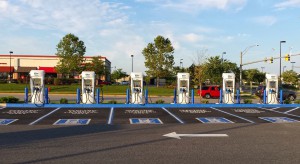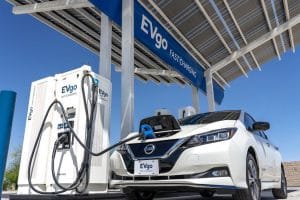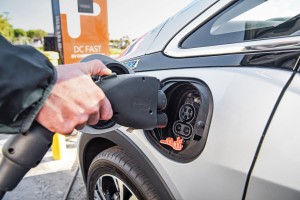With 100 new models scheduled to enter showrooms in the near future, electric vehicles are certain to play a big role in auto industry sales, but dealers and manufacturers must fashion strategies, including the development of more charging stations, to overcome the reservations consumers have about EV technology.
At the top of the list of reservations about electric vehicles, 83% of the consumers surveyed by Cox Automotive cited battery life and charging anxiety. In addition, 70% cited the cost of EVs as a significant barrier to consideration.
However, consumers also believe that going forward, EVs will be less expensive to operate on a day-to-day basis than vehicles with internal combustion engines.
(EVs Will Reach Cost Parity With Gas Cars “Sooner Than People Think,” says GM’s Reuss)
“This study is another affirmation of the importance of consumer education in the electric vehicle category,” noted Lea Malloy, associate vice president, emerging technology, Cox Automotive Mobility Group.
“Consumers see benefits in an electrified future but still need more assurance from dealers and automakers surrounding EV ownership. Collectively, dealers and automakers can deliver the confidence needed to advance EV adoption,” he said
Malloy noted the price gap between EVs and gas-powered vehicles is shrinking faster than most realize and continues to narrow.
EV pricing has only minimally increased in the last seven years while pricing for new internal combustion engine vehicles has spiked almost 19%. EVs could become even more attractive and affordable with the application of new rebates and other EV-focused purchasing incentives, Malloy noted.
In terms of total cost of operation, almost all EV Considerers – 98% – believe it is less expensive to own an EV, with 65% thinking there are cost savings to fuel/charging and 54% thinking there are cost savings to maintenance.
In fact, according to Kelley Blue Book, average Five-Year Cost-to-Own savings is significant for some EVs versus their gas-powered counterparts – 58% overall, with 60% in fuel savings and 25% in service cost savings across five years.
(GM and Bechtel planning JV to create new EV charging network.)
The bigger challenge facing the industry is the delivery of a sufficient public and private charging infrastructure.
“There is a clear need for more charging stations with 68% of EV owners citing a need for more charging availability around their home and 63% desiring more around their work,” Malloy said.
In addition to concern about the initial cost of purchasing an EV, consumers also have reservations involving battery life and the costs associated with battery replacement.
Consumers willing to consider an EV expect a range of about 240 miles, but ultimately are looking for a range of 300 miles, which is more in line with current gas-powered vehicles. With most current and future EVs meeting or exceeding consumer expectations, range should become less of a deterrent.

The new Nissan/EVgo-built charging stations along I-95 represent the growing number of competitors in the segment.
Of EV Considerers, 50% view the average battery life at 100,000 miles or more, and 46% thought average battery life was 65,000 miles or less. This is in comparison to the expected lifespan of an ICE powertrain of about 200,000 miles, according to Consumer Reports.
Providing assurance about battery lifespan and replacement cost concerns, the Federal government instituted a mandate for OEMs to offer a minimum of an Eight-Year/100,000-mile warranty on batteries. Some manufacturers are offering even more protection, such as the lifetime battery warranty on the Hyundai Kona EV.
Regardless of these affirmations, more than half of EV owners still elected to purchase the extended warranty for their battery, providing them with even more peace of mind. Much of this risk will likely soften with the advancements in battery technology and manufacturing.
(Barely One in Six Americans “Likely” to Buy an EV Next Time They’re in the Market)
In fact, the cost of lithium ion automotive batteries has decreased 77% since 2010 and another 45% decrease is anticipated by 2021. These are eventual cost savings that will benefit dealers, OEMs and EV shoppers.


